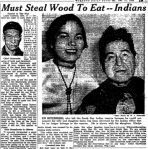An essay written by sister, Alicia Sayers, that outlines the history of my own family which includes no access to land/rights, displacement from the community, and residential schools.
Homeless in Their Homeland
The line, “homeless in their homeland” in J. Edward Chamberlin’s, If This is Your Land, Where are Your Stories?: Finding Common Ground illustrates the reasons of my existence and I wonder if others feel the same way. My family is my home and they have lived this quote throughout their lives. Their experience as the first people on the land to losing this land and their language has been transcended into me. Upon exploring their past I have been able to understand my present and the conflicts I face on a daily basis while attempting to find common ground as a First Nations woman living in a Western society.
These people are my thrice-great grandparents, Samuel Kitchigekek and Cecile Chawanassigekwe to my grandparent, Lilian Kitchikekek (Kitchikeg) all hailing from my mother’s side. Each generation has significant importance to me as they have experienced themes currently defining my life.
Cecile, a Potowatomi from Wisconsin, migrated to Manitloulin Island and became a part of the South Bay band, where Samuel was from. The band travelled during each year to harvest and during a harvest in 1862, a new treaty for Manitoulin was instituted. Unfortunately, the band missed the signing and was not granted any of their land. My family’s lifestyle was changed, as they had no rights to their land. Having no rights meant they were homeless in their homeland.
Less than 100 years later, the same story continued to affect my family. This is seen with my great grandfather, Edward Kitchigekek (1891-1964), who was removed from the South Bay band by the ‘Indian office’ because he left the reserve to make a living for his family. Edward was forced to leave because white settlers were moving onto the band’s land and he could not cut pulpwood, a source of income. He and five other families were being forced out of their own home.
In a broader perspective, the historic and political changes during this time affected my family in the most important way – changing their home and their lives. Treaty signings were meant to designate land, but the 1862 Manitoulin Island Treaty was meant to take away land as it preceded the previous treaty of 1836, which designated all of Manitoulin Island as reserve land. Additionally, this same treaty left no land for the South Bay band.
Over 100 years after the 1862 treaty, the Department of Indian and Northern Affairs finally granted the band land. They were amalgamated with Wikwemikong, an unceded territory of Manitoulin Island. This historical moment of the forced herding of my people into smaller acres of land was reflected in my family’s lives. My people could now lead their lives but only in terms of where the government allowed them to do so. In earlier times, my people could not even live on their own land, they were forced to roam their homelands.
My great-great grandfather, Gabriel Kitchigekek (1856-1929) and grandmother, Lillian Kitchikeg (1932-1970) also brought me to this time and place for two different reasons.  Gabriel was a medicine man who had a cure for skin cancer during this time and it is remembered by the community that many people travelled to see him. Lillian attended residential school at St. Joseph’s Spanish Indian Residential School where Basil H. Johnston remembers her in his book, Indian School Days. Gabriel and Lillian are a mirror of the two most important things in my life: culture and education. I am not arguing residential school was a positive experience, but the themes in their lives, are still prevalent in mine.
Gabriel was a medicine man who had a cure for skin cancer during this time and it is remembered by the community that many people travelled to see him. Lillian attended residential school at St. Joseph’s Spanish Indian Residential School where Basil H. Johnston remembers her in his book, Indian School Days. Gabriel and Lillian are a mirror of the two most important things in my life: culture and education. I am not arguing residential school was a positive experience, but the themes in their lives, are still prevalent in mine.
The themes of land, language and education are who I am today. I believe these themes will continue to not only exist throughout my life, but in the lives of my children. At times I try to grab from education to take the place of being away from my land and not being able to speak the same language as my ancestors, but it’s only a fraction of who I am. As a result, at times I feel homeless, yet at least I know where my home is, it’s in the survival of my family and my people. It is with this knowledge of why I have arrived here that I can now understand where I am going. I am going home.